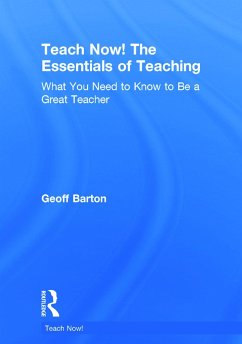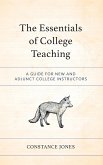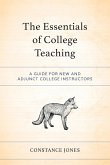- Gebundenes Buch
- Merkliste
- Auf die Merkliste
- Bewerten Bewerten
- Teilen
- Produkt teilen
- Produkterinnerung
- Produkterinnerung
Being taught by a great teacher is one of the great privileges of life. Teach Now! is an exciting new series that opens up the secrets of great teachers and, step-by-step, helps trainees to build the skills and confidence they need to become first-rate classroom practitioners.
Andere Kunden interessierten sich auch für
![How to Be a Happy Teacher How to Be a Happy Teacher]() Rachel BoucherHow to Be a Happy Teacher172,99 €
Rachel BoucherHow to Be a Happy Teacher172,99 €![The Long Game The Long Game]() Peter FosterThe Long Game155,99 €
Peter FosterThe Long Game155,99 €![Learning to Teach in the Primary School Learning to Teach in the Primary School]() Learning to Teach in the Primary School191,99 €
Learning to Teach in the Primary School191,99 €![The Guided Reader to Teaching and Learning The Guided Reader to Teaching and Learning]() Denis HayesThe Guided Reader to Teaching and Learning182,99 €
Denis HayesThe Guided Reader to Teaching and Learning182,99 €![Minimum Essentials in English: A Textbook for Grades From Seven to Twelve Minimum Essentials in English: A Textbook for Grades From Seven to Twelve]() Cathryn Rosanna Goble [From Old CatMinimum Essentials in English: A Textbook for Grades From Seven to Twelve31,99 €
Cathryn Rosanna Goble [From Old CatMinimum Essentials in English: A Textbook for Grades From Seven to Twelve31,99 €![The Essentials of College Teaching The Essentials of College Teaching]() Constance JonesThe Essentials of College Teaching60,99 €
Constance JonesThe Essentials of College Teaching60,99 €![The Essentials of College Teaching The Essentials of College Teaching]() Constance JonesThe Essentials of College Teaching33,99 €
Constance JonesThe Essentials of College Teaching33,99 €-
-
-
Being taught by a great teacher is one of the great privileges of life. Teach Now! is an exciting new series that opens up the secrets of great teachers and, step-by-step, helps trainees to build the skills and confidence they need to become first-rate classroom practitioners.
Produktdetails
- Produktdetails
- Verlag: Taylor & Francis
- Seitenzahl: 290
- Erscheinungstermin: 1. November 2014
- Englisch
- Abmessung: 211mm x 152mm x 23mm
- Gewicht: 476g
- ISBN-13: 9780415714907
- ISBN-10: 0415714907
- Artikelnr.: 39595659
- Herstellerkennzeichnung
- Libri GmbH
- Europaallee 1
- 36244 Bad Hersfeld
- gpsr@libri.de
- Verlag: Taylor & Francis
- Seitenzahl: 290
- Erscheinungstermin: 1. November 2014
- Englisch
- Abmessung: 211mm x 152mm x 23mm
- Gewicht: 476g
- ISBN-13: 9780415714907
- ISBN-10: 0415714907
- Artikelnr.: 39595659
- Herstellerkennzeichnung
- Libri GmbH
- Europaallee 1
- 36244 Bad Hersfeld
- gpsr@libri.de
Geoff Barton is Headteacher of King Edward VI School, a large comprehensive school in Suffolk, UK. He has written and edited more than 100 books on English and school leadership. He is a Founding Fellow of the English Association and a regular writer and speaker on education.
Introduction. Who Are You? Who Am I? How to Read this Book Part 1: Before
Training to Teach How to Know whether Teaching is the Career for You. So
What are You Worrying About? How Important is Training to be a Teacher? How
do Admissions Tutors View Prospective Applicants for Teacher Training? How
to Secure a Place on a Teacher Training Course. What to Expect in the
Interview for a Teacher Training Place. How to do Well at Interview for a
Training Place. What to do if You are Offered a Training Place Part 2:
Preparing for Teaching Practice How to Prepare for Visiting your Placement
School. How to Dress for Teaching Practice. How to Refer to Yourself on
Teaching Practice. How to Have Lunch. How to Use the Staffroom Part 3:
Teacher Training How to use the Teachers' Standards. Using Teacher's
Standard 1: How to Set High Expectations. Using Teacher's Standard 2: How
to Help Your Students to Achieve Good Progress. Using Teacher's Standard 3:
How to Demonstrate Good Knowledge of Your Subject. Using Teacher's Standard
4: How to Plan and Teach Well-Structured Lessons. Using Teacher's Standard
5: How to Adapt Your Teaching to Respond to the Strengths and Needs of all
Students. Using Teacher's Standard 6: How to Assess Students Accurately.
Using Teachers' Standard 7: How to Establish (and Maintain) Effective
Classroom Discipline. Using Teachers' Standard 8: Fulfil Wider Professional
Responsibilities. Using Part 2 of the Teachers' Standards: How to Conduct
Yourself as a Teacher - Your Personal and Professional Conduct. How to Use
Language. How to Establish (and Maintain) Effective Classroom Discipline.
How to Use Classroom Routines to Establish Good Behaviour as the Norm. How
to Emphasise Your Classroom Expectations. How to Use Your Body Language to
Reinforce Your Expectations of Good Behaviour. How to Deal with Challenging
Behaviour: Part A: Exploring the Issues. How to Deal with Challenging
Behaviour: Part B: Some Possible Responses. How to Praise Students. How to
be an Effective Tutor. How to Assess Whether You're Any Good as a Tutor
Part 4: Becoming a Teacher How to Apply for a Teaching Job. How to Write a
Good Letter of Application. How Different Application Letters Compare. How
to be Successful at Interview. How to Teach a Lesson on Interview. How to
Manage Parents' Evenings. How to Deal with Parental Complaints at Parents'
Evenings. How to Deal with a Complaint Against You Personally. How to
Respond to a Parents' Consultation Interview that goes Badly Wrong. How to
Deal with the Most Challenging Parents at a Parents' Evening. How to Write
High Quality Reports. How to Avoid Common Errors When Writing Reports Part
5: Next Steps You're a Teacher: What Were You Worrying About? What Next in
Your Career. Afterword. Appendix.
Training to Teach How to Know whether Teaching is the Career for You. So
What are You Worrying About? How Important is Training to be a Teacher? How
do Admissions Tutors View Prospective Applicants for Teacher Training? How
to Secure a Place on a Teacher Training Course. What to Expect in the
Interview for a Teacher Training Place. How to do Well at Interview for a
Training Place. What to do if You are Offered a Training Place Part 2:
Preparing for Teaching Practice How to Prepare for Visiting your Placement
School. How to Dress for Teaching Practice. How to Refer to Yourself on
Teaching Practice. How to Have Lunch. How to Use the Staffroom Part 3:
Teacher Training How to use the Teachers' Standards. Using Teacher's
Standard 1: How to Set High Expectations. Using Teacher's Standard 2: How
to Help Your Students to Achieve Good Progress. Using Teacher's Standard 3:
How to Demonstrate Good Knowledge of Your Subject. Using Teacher's Standard
4: How to Plan and Teach Well-Structured Lessons. Using Teacher's Standard
5: How to Adapt Your Teaching to Respond to the Strengths and Needs of all
Students. Using Teacher's Standard 6: How to Assess Students Accurately.
Using Teachers' Standard 7: How to Establish (and Maintain) Effective
Classroom Discipline. Using Teachers' Standard 8: Fulfil Wider Professional
Responsibilities. Using Part 2 of the Teachers' Standards: How to Conduct
Yourself as a Teacher - Your Personal and Professional Conduct. How to Use
Language. How to Establish (and Maintain) Effective Classroom Discipline.
How to Use Classroom Routines to Establish Good Behaviour as the Norm. How
to Emphasise Your Classroom Expectations. How to Use Your Body Language to
Reinforce Your Expectations of Good Behaviour. How to Deal with Challenging
Behaviour: Part A: Exploring the Issues. How to Deal with Challenging
Behaviour: Part B: Some Possible Responses. How to Praise Students. How to
be an Effective Tutor. How to Assess Whether You're Any Good as a Tutor
Part 4: Becoming a Teacher How to Apply for a Teaching Job. How to Write a
Good Letter of Application. How Different Application Letters Compare. How
to be Successful at Interview. How to Teach a Lesson on Interview. How to
Manage Parents' Evenings. How to Deal with Parental Complaints at Parents'
Evenings. How to Deal with a Complaint Against You Personally. How to
Respond to a Parents' Consultation Interview that goes Badly Wrong. How to
Deal with the Most Challenging Parents at a Parents' Evening. How to Write
High Quality Reports. How to Avoid Common Errors When Writing Reports Part
5: Next Steps You're a Teacher: What Were You Worrying About? What Next in
Your Career. Afterword. Appendix.
Introduction. Who Are You? Who Am I? How to Read this Book Part 1: Before
Training to Teach How to Know whether Teaching is the Career for You. So
What are You Worrying About? How Important is Training to be a Teacher? How
do Admissions Tutors View Prospective Applicants for Teacher Training? How
to Secure a Place on a Teacher Training Course. What to Expect in the
Interview for a Teacher Training Place. How to do Well at Interview for a
Training Place. What to do if You are Offered a Training Place Part 2:
Preparing for Teaching Practice How to Prepare for Visiting your Placement
School. How to Dress for Teaching Practice. How to Refer to Yourself on
Teaching Practice. How to Have Lunch. How to Use the Staffroom Part 3:
Teacher Training How to use the Teachers' Standards. Using Teacher's
Standard 1: How to Set High Expectations. Using Teacher's Standard 2: How
to Help Your Students to Achieve Good Progress. Using Teacher's Standard 3:
How to Demonstrate Good Knowledge of Your Subject. Using Teacher's Standard
4: How to Plan and Teach Well-Structured Lessons. Using Teacher's Standard
5: How to Adapt Your Teaching to Respond to the Strengths and Needs of all
Students. Using Teacher's Standard 6: How to Assess Students Accurately.
Using Teachers' Standard 7: How to Establish (and Maintain) Effective
Classroom Discipline. Using Teachers' Standard 8: Fulfil Wider Professional
Responsibilities. Using Part 2 of the Teachers' Standards: How to Conduct
Yourself as a Teacher - Your Personal and Professional Conduct. How to Use
Language. How to Establish (and Maintain) Effective Classroom Discipline.
How to Use Classroom Routines to Establish Good Behaviour as the Norm. How
to Emphasise Your Classroom Expectations. How to Use Your Body Language to
Reinforce Your Expectations of Good Behaviour. How to Deal with Challenging
Behaviour: Part A: Exploring the Issues. How to Deal with Challenging
Behaviour: Part B: Some Possible Responses. How to Praise Students. How to
be an Effective Tutor. How to Assess Whether You're Any Good as a Tutor
Part 4: Becoming a Teacher How to Apply for a Teaching Job. How to Write a
Good Letter of Application. How Different Application Letters Compare. How
to be Successful at Interview. How to Teach a Lesson on Interview. How to
Manage Parents' Evenings. How to Deal with Parental Complaints at Parents'
Evenings. How to Deal with a Complaint Against You Personally. How to
Respond to a Parents' Consultation Interview that goes Badly Wrong. How to
Deal with the Most Challenging Parents at a Parents' Evening. How to Write
High Quality Reports. How to Avoid Common Errors When Writing Reports Part
5: Next Steps You're a Teacher: What Were You Worrying About? What Next in
Your Career. Afterword. Appendix.
Training to Teach How to Know whether Teaching is the Career for You. So
What are You Worrying About? How Important is Training to be a Teacher? How
do Admissions Tutors View Prospective Applicants for Teacher Training? How
to Secure a Place on a Teacher Training Course. What to Expect in the
Interview for a Teacher Training Place. How to do Well at Interview for a
Training Place. What to do if You are Offered a Training Place Part 2:
Preparing for Teaching Practice How to Prepare for Visiting your Placement
School. How to Dress for Teaching Practice. How to Refer to Yourself on
Teaching Practice. How to Have Lunch. How to Use the Staffroom Part 3:
Teacher Training How to use the Teachers' Standards. Using Teacher's
Standard 1: How to Set High Expectations. Using Teacher's Standard 2: How
to Help Your Students to Achieve Good Progress. Using Teacher's Standard 3:
How to Demonstrate Good Knowledge of Your Subject. Using Teacher's Standard
4: How to Plan and Teach Well-Structured Lessons. Using Teacher's Standard
5: How to Adapt Your Teaching to Respond to the Strengths and Needs of all
Students. Using Teacher's Standard 6: How to Assess Students Accurately.
Using Teachers' Standard 7: How to Establish (and Maintain) Effective
Classroom Discipline. Using Teachers' Standard 8: Fulfil Wider Professional
Responsibilities. Using Part 2 of the Teachers' Standards: How to Conduct
Yourself as a Teacher - Your Personal and Professional Conduct. How to Use
Language. How to Establish (and Maintain) Effective Classroom Discipline.
How to Use Classroom Routines to Establish Good Behaviour as the Norm. How
to Emphasise Your Classroom Expectations. How to Use Your Body Language to
Reinforce Your Expectations of Good Behaviour. How to Deal with Challenging
Behaviour: Part A: Exploring the Issues. How to Deal with Challenging
Behaviour: Part B: Some Possible Responses. How to Praise Students. How to
be an Effective Tutor. How to Assess Whether You're Any Good as a Tutor
Part 4: Becoming a Teacher How to Apply for a Teaching Job. How to Write a
Good Letter of Application. How Different Application Letters Compare. How
to be Successful at Interview. How to Teach a Lesson on Interview. How to
Manage Parents' Evenings. How to Deal with Parental Complaints at Parents'
Evenings. How to Deal with a Complaint Against You Personally. How to
Respond to a Parents' Consultation Interview that goes Badly Wrong. How to
Deal with the Most Challenging Parents at a Parents' Evening. How to Write
High Quality Reports. How to Avoid Common Errors When Writing Reports Part
5: Next Steps You're a Teacher: What Were You Worrying About? What Next in
Your Career. Afterword. Appendix.








